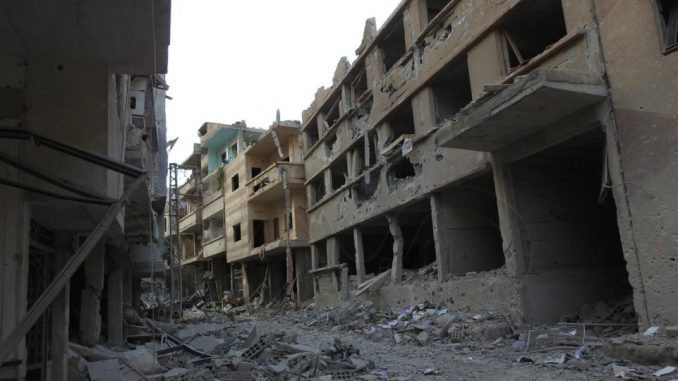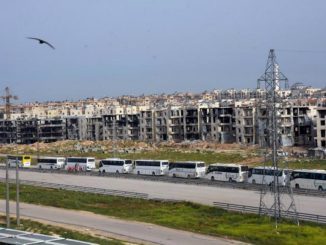
Sources said the Assad regime and the rebels forces have reached a new agreement to solve the dispute in Wadi Barada that created the water crisis in Damascus since about a month ago.
Assad regime forces backed by Hezbollah and Shia militias have launched the attack on Wadi Barada valley since 22 December, with daily bombing and air raids on the area. The water in Damascus has been cut ever since.
Rebels say the army is seeking to recapture the area, where a major spring provides most of Damascus’s water supplies and which lies on a major supply route from Lebanon to the Syrian capital used by Hezbollah.
The daily clashes are associated with heavy shelling operations by the regime forces using tanks, artillery and mortar shells, and the launching missiles believed to be ground-to-ground, along with airstrikes by warplanes and the barrel bombs of the helicopters, which left tens casualties and injuries
The government assault has coincided with a severe water shortage in Damascus since December 22. Images from the valley’s Media Center indicate its Ain al-Fijeh spring and water processing facility have been destroyed in air strikes.
Rebels say the government bombed the water pumping station at the start of the campaign, while the government says rebels spoiled the water source with diesel fuel, forcing it to cut supplies to the capital.
Wadi Barada has been surrounded by government forces since mid-2015, but the siege was tightened in late December as the army piled on pressure seeking to secure a “reconciliation” deal.
It has won several of these deals in opposition areas around the capital, offering safe passage to surrendering rebels in return for retaking territory.
#وادي_بردى #WadiBarada
صور لنبع #عين_الفيجة الذي يعتبر مصدر مياه الشرب الرئيسي لسكان العاصمة #دمشق قبل و بعد إستهدافه من قبل قوات النظام pic.twitter.com/9CRDAcHKH6— وادي بردى (@w_barada) December 26, 2016
The failed efforts
However, the regime and rebel forces have reached on January 13 a deal to allow the repair teams to enter the area in return to halt the military operations and the bombing.
By late Friday afternoon, however, the opposition Wadi Barada Media Center posted pictures of maintenance equipment arriving in the water-rich Barada Valley.
The engineers had entered the facilities at Ain al-Fija in the opposition-held Wadi Barada area by agreement with the rebels, the governor said on Ikhbariya channel on Friday.
The Syrian Observatory for Human Rights (SOHR) confirmed that repair crews had reached the Ain al-Fijah spring and that the Syrian flag had been raised in the area. However, this ceasefire failed and the clashes erupted again.
The Observatory said shells hit Al-Reem banquet hall in the village of Deir Qanoun on Sunday.
The banquet hall has been housing hundreds of civilians who have escaped the intensified fighting for Wadi Barada that started on December 22, according to local activists.
The SOHR said besides the fatalities, at least 20 other people were wounded in the attack, some of them critically.
“This is the highest toll there since the beginning of the truce [on December 30],” said Rami Abdel Rahman, SOHR’s head.
Sources said that the clashes were resumed after the death of the government official who negotiated a deal to restore water to Damascus.
Ahmed al-Ghadban had been on his way to the main Ain al-Fijah spring with government maintenance teams when he was killed.
Opposition fighters and government officials have traded blame over the killing of the retired army officer, who had assumed his duties on Saturday.
A new deal
The Media Committee of Wadi Barada valley announced on Thursday reaching a preliminary agreement between opposition fighters in the valley and Assad regime.
The regime delegation met with civil and military representatives from the valley, and they agreed on a number of terms, the most important of which are:
1. Effecting a ceasefire and stopping the military operation on Wadi Barada.
2. Giving immediate access for maintenance teams to Ein al-Fijeh water facility.
3. Status of the opposition fighters who choose to stay will be regularized.
4. Listing the names of those opposition fighters who refuse to be regularized and have them sent to Idlib under UN and ICRC auspices.
5. Assad regime forces and their backing militias shall leave Bassimeh within a certain period of time, and Assad regime froces shall stay at the points they reached to in Ein al-Fijeh.
6. Rebuilding Bassimeh village and Ein al-Fijeh town within a certain period of time.
The meeting was ended with both parties waiting the implementation of the agreement terms, said the media committee.
The Syrian crisis began as a peaceful demonstration against the injustice in Syria. Assad regime used to fire power and violence against the civilians and led to armed resistance. 450.000 Syrians lost their lives in the past five years according to UN estimates, and more than 12 million have lost their homes.



